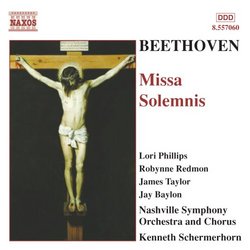| All Artists: Ludwig van Beethoven, Kenneth Schermerhorn, Robynne Redmon, Nashville Symphony, Lori Phillips, James Taylor Title: Beethoven: Missa Solemnis Members Wishing: 0 Total Copies: 0 Label: Naxos Release Date: 3/16/2004 Genre: Classical Styles: Opera & Classical Vocal, Historical Periods, Classical (c.1770-1830), Symphonies Number of Discs: 1 SwapaCD Credits: 1 UPC: 747313206025 |
Search - Ludwig van Beethoven, Kenneth Schermerhorn, Robynne Redmon :: Beethoven: Missa Solemnis
 | Ludwig van Beethoven, Kenneth Schermerhorn, Robynne Redmon Beethoven: Missa Solemnis Genre: Classical
One of the greatest masterworks in the history of music, which makes considerable technical demands particularly of the soloists and the choir, Beethoven?s Missa Solemnis was regarded by the composer as the summit of his a... more » |
Larger Image |
CD DetailsSynopsis
Album Description One of the greatest masterworks in the history of music, which makes considerable technical demands particularly of the soloists and the choir, Beethoven?s Missa Solemnis was regarded by the composer as the summit of his artistic achievements. It is a work of enormous proportions and extraordinary emotional and musical contrasts, alternating passages of tense drama with interludes of blissful serenity. The conflict of exuberance, anguish, faith and doubt is seemingly resolved only by the final petition of the Agnus Dei, Bitte um innern und äussern Frieden (Prayer for inner and outward peace), words that some have seen as a reflection of Beethoven?s own inner turmoil. Missa Solemnis was composed from 1819-1823, when Beethoven was completely deaf. Despite illness and the rejection of loved ones at the time of this composition. The piece is dedicated to "My God who has never deserted me." Beethoven?s profound faith can be heard in every measure of this work that the composer himself called "the greatest work which I have composed thus far." He creates here something that is both old and completely new, a spiritual apotheosis comparable to that he brought about with his last symphony. Similarly Requested CDs
|
CD ReviewsFills the low-price niche very well Larry VanDeSande | Mason, Michigan United States | 07/30/2004 (4 out of 5 stars) "Any new recording of the Beethoven "Missa Solemnis" is in itself an achievement, for this is the most daunting, difficult choral work to bring off short of any choral piece composed by John Cage in the 12-tone heyday. I have performed this a couple times as a singer -- once as a tenor, once as a bass -- and it was the most difficult work to perform of my lifetime thus far. The first time I sang in the chorus, I was certain -- less than a month before performance -- that we would not be able to do it. We did, but only with great struggle. You hear some of that struggle in this recording, which is very good and fills an important niche in the single disc low-price field. I think this might be the best recording of this music emanating from a low price recording since Gunther Wand's two-disk set released by Nonesuch about 1965. That set was recently reissued on the full price Testament label. The struggle you hear on this recording is represented most directly in the bass soloist and the bass section of the choir. Neither are very powerful, especially in projecting the bass notes Beethoven wrote below the staff. The bass runs in "Credo", which are incredibly difficult to pull off, are about impossible to hear in this recording. This is not necessarily a criticism, although when you put out money for a recording you may expect to hear everything. Otherwise, this is a very good recording, done very well by the Nashville symphony, the chorus and soloists. In particular, the soprano and tenor are exemplary singers that belt out the music real well. Some performers spend a lot of time deliniating the differences between the pianissiomo (ppp) to fortissimo (fff) markings in the score. I don't hear that on this recording, but I also don't think it's going to detract from your enjoyment of the music. A lot of critics grade the "Missa Solemnis" by how well they think it meets devotional criteria and how well it projects spiritual fervor. A great recording from the past, the Josef Krips-led recording that most recently appeared on Everest, was dismissed by some critics for its lack of devotion and doing little more than presenting the music. Recordings led by Klemperer, Bohm and Levine are generally preferred by critics that believe this the best approach to the music. I don't think this is valid criticism nor do I believe it is an appropriate standard with which to burden performers. Beethoven was hardly a religious person. He was a terrible Catholic that wrote this music at the end of his life when deafness had overtaken him. His music is unreligious and, if it were performed during a religious observance, it would dwarf the ceremony. So I have never bought the argument that any good performance has to project devotion or spirituality. I'm in the Toscanini camp on this. He once said about the Beethoven 5th symphony, "Some people hear Napoleon in this. Others hear Hitler. I only hear allegro non troppo." This performance does all that and more, even with the shallow bass response. It is definitely worth $7 and will probably be the best low-price version available for some time." A New Recording of the Missa Solemnis Robin Friedman | Washington, D.C. United States | 04/06/2004 (5 out of 5 stars) "I have always taken an interest in the career of conductor Kenneth Schermerhorn of the Nashville Symphony Orchestra. Schermerhorn became the conductor of the Milwaukee Symphony Orchestra at about the time I was leaving Milwaukee and turned it into a first-rate ensemble. The Milwaukee Symphony was my first and for a long time only source of professional, live orchestral music as I developed as a child what would become a lifelong passion for music. Schermerhorn has proceeded to make some outstanding releases of American orchestral music with the Nashville Symphony on Naxos. With this CD, he conducts one of music's seminal works: Beethoven's Missa Solemnis, opus 123. The music is performed anew by a rising American conductor,orchestra, and chorus with four young American soloists: soprano Lori Phillips, mezzo-soprano Robynne Redmon, tenor James Taylor, and bass Jay Baylon.The Missa Solemnis is a rare work in that it combines on a vast scale music of a subjective, deeply personal intimacy with an extraordinary showing of musical study and learning.The personal character of the work can be shown by two famous markings Beethoven put at key points in the score. The Mass was dedicated to the Archduke Rudolf, Beethoven's longtime patron. On the Archduke's copy of the score at the head of the opening Kyrie Beethoven wrote "Von Herzen -- mogen es wieder -- Zu Herzen gehen!" -- From the heart, may it go to the heart! Then, Beethoven wrote an inscription on the final section of the Mass which read: "Bitte um innern and aussern Frieden" -- Prayer for inner and outer peace. This last phrase captures much of the essence of the Missa Solemnis as Beethoven tried to come to terms with the difficulties of his own life and write spiritual music for himself and for generations of listeners.The learned character of the Missa Solemnis is shown by the variety and difficulty of the musical forms Beethoven utilized in his work. The Missa Solemnis shows that Beethoven had made an extensive study of music and of the mass dating back to the time of Palestrina. The work shows an exhaustive study of fugue and of counterpoint and of ancient musical modes. I think the chief musical influence on Beethoven in the work was that of Handel, but many scholars think Beethoven studied Bach's B-minor mass as well. Learned counterpoint abounds in this work, particularly in the second and third sections, the Gloria and the Credo and in the "Osanna" of the fourth section, the Sanctus.The work contrasts some serene, meditative music for chorus,soloists and orchestra, such as the opening Kyrie with the fiery passion of the Gloria and the Credo. The Sanctus features beautiful solo playing by the first violin, here performed by concertmaster Mary Kathryn Van Osdale together with the chorus. The final movement is a lengthy vision of spiritual peace, with moving interactions between the orchestra and chorus.The Missa Solemnis is a notoriously difficult work to sing and does not always fare well in performance. It is hard to make the very different musical forms and textures that Beethoven used in this work cohere together as a unit. For some listeners, the Missa Solemnis remains a forbidding work, and for many listeners it will require patience and several hearings to appreciate this music. Scherhorn's performance here succeeds in capturing the unity of this work, with an emphasis on its lyrical and radiant character.It is a joy to have this music performed by an Orchestra in American's heartland for a new generation of listeners. From the heart, may this music go to the heart." An Outstanding Budget 'Missa Solemnis' J Scott Morrison | Middlebury VT, USA | 03/20/2004 (5 out of 5 stars) "My personal benchmarks for the 'Missa Solemnis' are those by Bernstein and John Eliot Gardiner. Bernstein recorded it several times (including once with Eileen Farrell, Kim Borg and Richard Lewis, but hard to find and in less than wonderful sound), but my favorite is the one with the Vienna Philharmonic with soloists René Kollo, Gwyneth Jones, Hanna Schwarz and Kurt Moll. Gardiner's version, of course, is recommendable because it uses original instruments and historically-informed performance practice. It also happens to be lighter on its feet than most traditional recordings, a real plus in my book. I love the 'Missa Solemnis' but I get a little weary with bombastic performances of the 'Gloria.' Neither Gardiner nor Bernstein makes that mistake, but additionally Gardiner's clear textures bring out the incredible part-writing while not diluting the sense of exultation and praise.Here we have another fine 'Missa Solemnis' from, I first thought, an unlikely source: Kenneth Schermerhorn, the Nashville Symphony and Chorus, and a group of soloists who are virtually unknown. We must remember, however, that Schermerhorn is no neophyte and was, indeed, a protégé of Bernstein's early in his career. Further, I have been increasingly impressed by the work turned in by the Nashville Symphony. Nashville is a growing community with a large commitment to the arts and a lively music school at Vanderbilt University, in whose Ingram Hall this performance was recorded. So, perhaps my biggest surprise is the level of artistry from the four soloists. They are Lori Phillips, a soprano who includes the title rôle of 'Turandot' in her fach; Robynne Redmon, a rich-voiced contralto-ish mezzo; James Taylor, one of the sweetest-voiced tenors around--he has been a stalwart of Helmut Rilling's Oregon Bach Festival for a number of years; and Jay Baylon, who has sung the Dutchman at the San Francisco Opera. They are equally matched and equally outstanding. The only slightly weak link in this chain is the Nashville Symphony Chorus which can sound a bit raw, particularly in the fortissimo sections. On the other hand, they sing exquisitely at softer points in the score like the 'Qui propter nos homines' section of the 'Credo' or in the stirring fugue of the 'Agnus Dei.' Although they are singing in a Italian-inflected Latin, their diction would never be mistaken for anything but middle American. Finally, a word of praise for the orchestra's concertmaster, Mary Kathryn Van Osdale, who plays the luscious violin obbligato in the 'Benedictus' with sweet mastery.I've sat through a number of really boring performances of the 'Missa Solemnis.' There seems to be something about it that inspires musicians to be either soggy or pompous, or both. This performance is neither. The 'Agnus Dei' with its final 'Dona nobis pacem' contains rich divided strings, stirringly martial, almost Mahlerian, brass and chorus, and finally utter calm. Beethoven's is, in my opinion, the most effective ending for a concert Mass ever written. It is given its due here, with sumptuous singing from chorus and soloists and restrained but rich instrumental support. If you're looking for a 'Missa Solemnis' with traditional forces you won't go wrong getting this one. And, of course, Naxos's budget price is an additional enticement.Recommended.TT=77:11Scott Morrison"
|

 Track Listings (11) - Disc #1
Track Listings (11) - Disc #1





